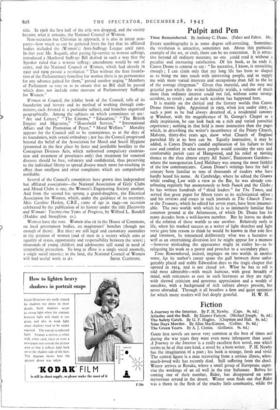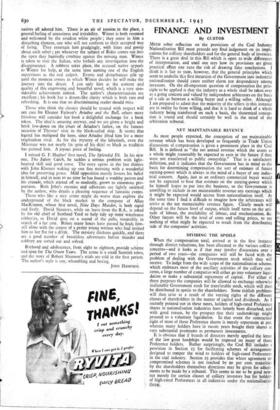Fiction
GOOD first novels are never very common at the best of times and during the war years they were even more infrequent than usual. A Journey to the Interior is a really excellent first novel, one which seems to be of that rare kind, a novel by a born writer. P. H. Newby has the imagination of a poet ; his book is strange, fresh and vivid. The central figure is a man recovering from a serious illness, whose much-loved wife has recently died. Still suffering from the shock, Winter arrives at Rasuka, where a small group of Europeans super- vise the workings of an oil well in the tiny Sultanate. Before his coming one of their number, Rider, has disappeared on some mysterious errand in the desert. Winter soon finds out that Rider F.3fla was a thorn in the flesh of the touchy little community, while the
natives all adored him. There is an air of tension in the place, a general feeling of uneasiness and irritability. Winter is both resented and welcomed by the resident white people ; they sense in him a disturbing element, one who will not conform to their accepted Way of living. They entertain him grudgingly, with hints and gossip about each other ; yet whenever the subject of Rider comes out into the open they hurriedly combine against the missing man. Winter is taken to visit the Sultan, who forbids any investigation into the disappearance. A robbery takes place, the accused native appeals to Winter for help, at the same time naming one of the English supervisors as the real culprit. Events and disturbances pile up until the moment comes in which Winter decides he will make the journey into the desert. I can only hint at the content and quality of this engrossing and beautiful novel, which is a very con- siderable achievement indeed. The author's characterisations are excellent ; his book has a dream-like clarity which is both rare and refreshing. It is one that no discriminating reader should miss.
Those who think the classics should be treated with respect will not care for Eleanor Farjeon's Ariadne and the Bull, others more frivolous will consider her book a delightful exchange for a book token. The idea is amusing anyway, and we are given a bright and brisk low-down on the court of Ariadne's father, on the famous occasion of Theseus' visit in the black-sailed ship. It seems that legend has maligned the hero, since Ariadne jilted him for a more resplendent rival. As for the mystery of the labyrinth, even the Minotaur was not nearly (in spite of his skin) so black as traditiOn
has painted him. A joyous piece of fooling. 1
I missed G. F. Hughes' first novel, The Splendid Eli. In his new one, The Safety Catch, he tackles a serious problem with light- hearted skill and good sense. The story opens in the late thirties with John Klooner waking up one fine morning with a wonderful idea for preserving peace. Mild opposition merely fosters his belief in himself, and in next to no time he has found a wealthy patron and his crusade, which started off so modestly, grows to enormous pro- portions. Both John's enemies and adherents are lightly satirised by the author, who details a pleasing sequence of fantastic events. Those who like a nice crime might do worse than explore the underground of the black market in the company of Allan MacKinnon, whose first novel, Nine Days Murder, is both rapid and lively. David Stanners, while on leave from the R.A., is asked by his old chief of Scotland Yard to help tidy up sante" Warehouse robber:es, so David goes on a round of the pubs, ostensibly in search of a fur coat. Before many hours have passed he finds him- self alone with the corpse of a pretty young woman who had invited him to her flat for a drink. The mystery thickens quickly, and there are a good number of breathless adventures before murder and robbery are sorted out and solved.
Boyhood and adolescence, from eight to eighteen, provide scheme and span for The Green Years. The scene is a small Scottish ton, and the story of Robert Shannon's trials are told in the first person. The author's style is coy, whambling and boring.
JOHN HAMPSON.































 Previous page
Previous page